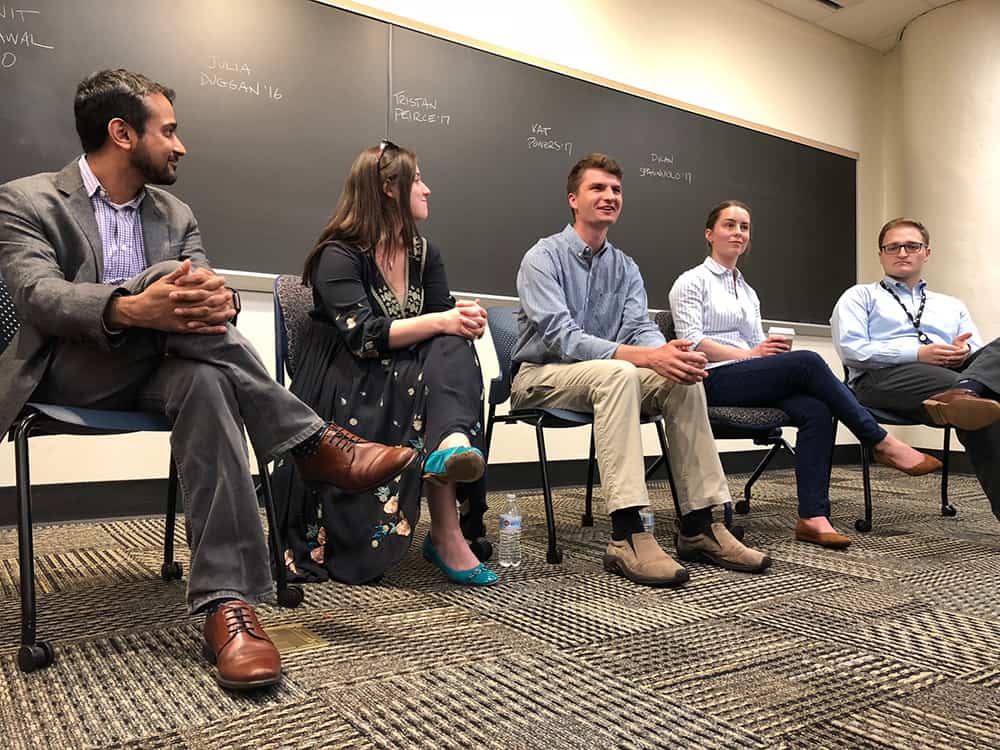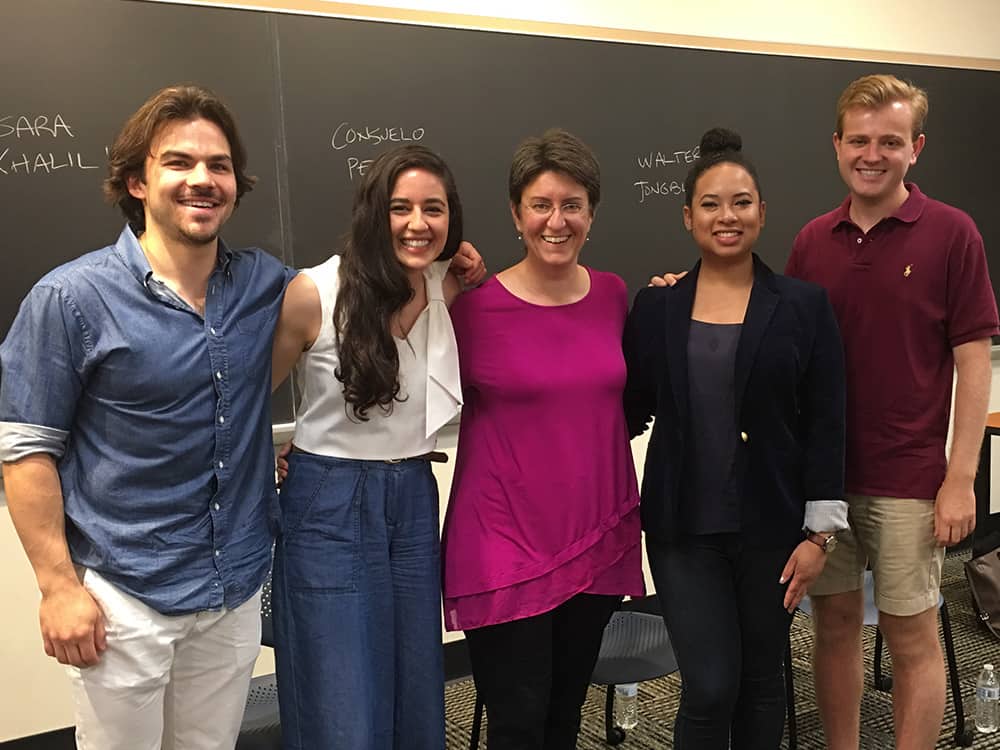Students in Trinity’s Interdisciplinary Science Program Conduct Summer Research
Hartford, Connecticut, July 16, 2018—Jason Deck ’21 is spending his summer conducting research with Trinity College Assistant Professor of Chemistry Professor Michelle Kovarik. Working together in the lab, they are studying a social amoeba and measuring types of reactive oxygen species that the organism produces as a result of metabolizing glucose.
Deck is a part of Trinity’s Interdisciplinary Science Program (ISP), open to a select group of students who have exceptional scientific aptitude, and designed to broaden and enrich the study of science and mathematics by exploring the links between the scientific disciplines and their connections with the external world. Each year, ISP welcomes approximately 20 first-year students, exposing them to scientific research from the start of their college career, including the opportunity to conduct independent research during their first spring semester.

ISP students also have the opportunity to join upper-year student researchers in Trinity’s 10-week summer research program (which includes a stipend and housing), through which students conduct research on campus with faculty members. For ISP student participants, it is not only an opportunity to continue the research they started in the spring semester, but to be paid to do scientific work as a rising sophomore.
Science Center Director Alison J. Draper said that the ISP summer research offers a chance for students to be with peers of similar interests and similar motivation. “Summer gives students the time and intellectual space to take a deep dive into their research that most are not able to do during the semester,” Draper said. “My favorite part is seeing the students grow and discover what they like and don’t like and seeing the first-year students integrate better into the larger social group of upper-year science research students.”
Deck said participating in ISP has honed his interests and exposed him to new topics. “Initially, upon arriving at Trinity, I was set on being a biology major,” he said. “ISP as a whole guided me to the Chemistry Department here at Trinity, and, as a result of my research, I plan to be a biochemistry major now.” Deck said that he also appreciated another implicit advantage of ISP: “Besides the innumerable laboratory skills, ISP has helped me learn some life skills that will remain with me for the rest of my life.”
Upper-year students who have been through ISP said that the program not only taught them how to conduct research and to write reports, but also advanced their scientific knowledge. “We read different research papers by several scientists and that opened our minds to different ideas,” said Kalsang Sherpa ’20, a mathematics major from Nepal. Sherpa added that ISP provided her with a platform where she could discuss issues involving science and society in an academically enlightening environment.

As part of the summer research program, students attend weekly lunchtime lectures or panel discussions featuring Trinity alumni and other guests. At the June 26 panel, “Preparing for the Workplace Post-Trinity,” recent graduates who were in the ISP recalled their experiences at Trinity. Vinit Agrawal ’10, a computer science and mathematics major who now works as a quantitative equity analyst and portfolio manager at T. Rowe Price in Baltimore, described a range of experiences he benefitted from at Trinity. Among the most memorable: he and two other students received Trinity’s first Projects for Peace grant, which enabled them to work on promoting the benefits of solar lighting in Nepal. Their Projects for Peace proposal actually came about because of an ISP assignment to write a grant proposal.
Similarly, Tristan Peirce ’17, an engineering and mathematics major who is working as an associate engineer at Pratt & Whitney in Middletown, Connecticut, talked about a part-time job he had in Trinity’s Admissions Office that was just as valuable as his academic and research pursuits in preparing him for life after Trinity. “I worked as a student admissions associate, and that was definitely an advantage because that job prepared me for interviews and taught me to expect the unexpected,” Peirce said.
The alumni panelists also addressed questions raised by current students, including how the panelists were able to get their first jobs. “I got an internship right after I graduated with the help of an alum,” said Julia Duggan ’16, a clinical bioinformatics analyst at Foundation Medicine who majored in neuroscience.
Kathryn Powers ’17, a double-major in biochemistry and biology who is now a research assistant in neuroscience at UConn Health Center, said that a STEM (science, technology, engineering, and mathematics) professor offered her first job to her. The alumni on the panel continuously emphasized how close-knit and incredibly useful the alumni network and STEM faculty had been in their job searches.
Students in the audience asked about whether they would need to obtain a master’s degree before they enter the job market. Agrawal said that it completely depends on the prerequisites of each job. “It can go either way. I did my master’s because my job required me to. Some jobs also finance your master’s,” he said.
Powers added, “There are some employers who prefer just the undergraduate degree, as it’s less specialized.”
When asked how Trinity helped the alumni choose a career path and conduct a job search, Dylan Spagnuolo ’17, a business intelligence consultant at The Hartford, said, “Students should utilize resources offered by the Career Development Center.” Trinity’s Center for Student Success and Career Development offers career exploration programs, internship opportunities, resume and cover-letter-building workshops, and connections to Trinity’s alumni network. Spagnuolo, who double-majored in mathematics and language and culture studies, also said that an applied math internship he pursued while studying away in France was a highlight of his Trinity career.
Farahana Appiah ’21, who is conducting research this summer with Thomas S. Johnson Distinguished Professor of Biology Daniel G. Blackburn, said that the alumni panelists encouraged students to think about what they want to do after graduation. “I have learned that our plans do not always work exactly as we think they should,” Appiah said. “Hence, we should take the opportunity to try different things on campus and take classes outside our majors because one may never know where they will find a new or optimal interest.”
The summer lecture and panel discussion series continues through July 17 for ISP students and other Trinity students who are currently conducting summer research.
